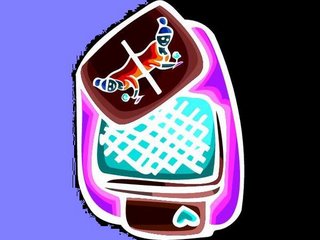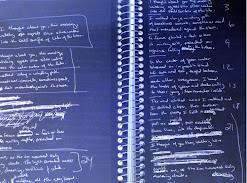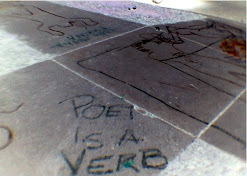Over the weekend, my husband and I saw an amazing movie called The Prestige. It was such a well-written, well-structured movie that my husband (also a writer) was devastated. He was so devastated, so cowed by the quality of this movie, that he considered stopping the project that he's been working on for 2 months. He's 44 pages in and he almost threw in the towel! Weird reaction? Not as weird as you think.
Ideally, writers, when confronted with a sublime example of their art, are inspired to produce work on their own. Perhaps, it inspires an homage to the original work of art. Or, perhaps, the artists are invigorated, ready to confront their work with a new perspective or new verve.
Confrontation with a work of perfect human creation should be, for artists, a confrontation with the divine. When I say divine, I do not necessarily mean the hand of God, although that is what the word is originally derived from. I only mean the contact with something outside of ourselves, that must be expressed through our art. In fact, American Heritage dictionary, cites one of the definitions of inspiration as "Divine guidance or influence exerted directly on the mind and soul of humankind."
But confrontation with the divine is both splendid and terrifying. Splendidly terrifying. It is terrifying precisely because when a piece of writing or art is so perfectly composed, we can no longer detect the human creator behind the art. It becomes a seamless work of art that seems to be natural. We forget that the quality is not intrinsic to the product; it is there because of the artist. A human artist, with weakness and insecurity and failings, like every other writer or artist out there.
Now, I'm not saying that The Prestige is divine, but it is damn good. But inside its story, my husband was confronted, momentarily, with something special outside of himself. And it devastated him, because he did not know whether or not he would ever produce that same effect on another person. My husband is at that stage in the creative process where his work is still new and tender. It needs nurturing and work, not the evidence of some other writer's brilliant and seemingly seamless handiwork.
I remember, for me, when I was writing my master's thesis that I had that moment. I was a masochist enough to read the early books of many of my favorite writers. I figured at the time that if I could see their unsure, early work I would be encouraged on my own. Instead, I came across a book that inspired me to a full-on breakdown, complete with tears and assumptions of failure. It was called Ararat, by Louise Gluck. The book was so beautiful and layered and complex, everything I wanted my book to be, that I thought I could never compare. And let's be honest, it's Louise Gluck -- I'm not in the same stratosphere. Once I remembered that, and became okay with that, my writing continued.
So, this week it's The Prestige for my husband and once upon a time Ararat for me. What piece of art was it for you that made you want to quit? How did you survive it?
Ideally, writers, when confronted with a sublime example of their art, are inspired to produce work on their own. Perhaps, it inspires an homage to the original work of art. Or, perhaps, the artists are invigorated, ready to confront their work with a new perspective or new verve.
Confrontation with a work of perfect human creation should be, for artists, a confrontation with the divine. When I say divine, I do not necessarily mean the hand of God, although that is what the word is originally derived from. I only mean the contact with something outside of ourselves, that must be expressed through our art. In fact, American Heritage dictionary, cites one of the definitions of inspiration as "Divine guidance or influence exerted directly on the mind and soul of humankind."
But confrontation with the divine is both splendid and terrifying. Splendidly terrifying. It is terrifying precisely because when a piece of writing or art is so perfectly composed, we can no longer detect the human creator behind the art. It becomes a seamless work of art that seems to be natural. We forget that the quality is not intrinsic to the product; it is there because of the artist. A human artist, with weakness and insecurity and failings, like every other writer or artist out there.
Now, I'm not saying that The Prestige is divine, but it is damn good. But inside its story, my husband was confronted, momentarily, with something special outside of himself. And it devastated him, because he did not know whether or not he would ever produce that same effect on another person. My husband is at that stage in the creative process where his work is still new and tender. It needs nurturing and work, not the evidence of some other writer's brilliant and seemingly seamless handiwork.
I remember, for me, when I was writing my master's thesis that I had that moment. I was a masochist enough to read the early books of many of my favorite writers. I figured at the time that if I could see their unsure, early work I would be encouraged on my own. Instead, I came across a book that inspired me to a full-on breakdown, complete with tears and assumptions of failure. It was called Ararat, by Louise Gluck. The book was so beautiful and layered and complex, everything I wanted my book to be, that I thought I could never compare. And let's be honest, it's Louise Gluck -- I'm not in the same stratosphere. Once I remembered that, and became okay with that, my writing continued.
So, this week it's The Prestige for my husband and once upon a time Ararat for me. What piece of art was it for you that made you want to quit? How did you survive it?




0 Comments:
Post a Comment